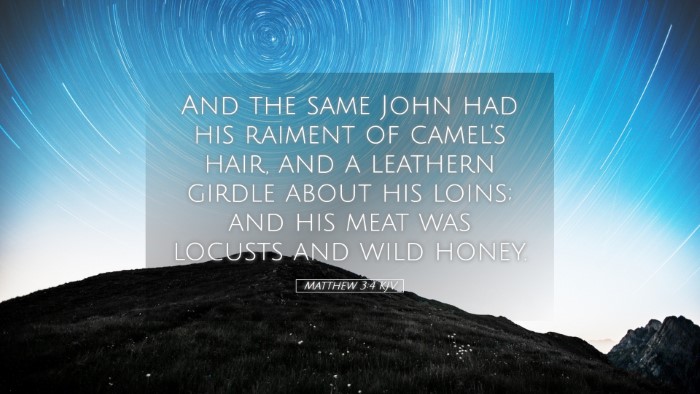Commentary on Matthew 3:4
Verse Reference: Matthew 3:4 - "And the same John had his raiment of camel's hair, and a leathern girdle about his loins; and his meat was locusts and wild honey."
Introduction
This verse introduces John the Baptist, a pivotal figure in the New Testament, known for his ascetic lifestyle and his role in preparing the way for Jesus Christ. The details of his appearance and dietary habits are not mere historical facts but are rich in theological significance and prophetic symbolism.
John's Raiment: Symbolism of Camel's Hair
Matthew Henry's Commentary: Henry observes that the clothing of John the Baptist, made of camel's hair, connects him to the profusion of Old Testament prophets, such as Elijah, who is described in 2 Kings 1:8 as attired in a garment of hair. This detail emphasizes that John is a prophetic figure, heralding the coming of Christ.
Albert Barnes' Insights: Barnes elaborates that this garment symbolizes humility and a distancing from worldly comforts, reflecting John’s prophetic mission. His choice of clothing serves as an outward manifestation of an inward commitment to God and a rejection of luxury—an important principle for those called to spiritual leadership.
The Leathern Girdle: A Belt of Simplicity
Adam Clarke's Observations: Clarke explains that the girdle or belt, traditionally worn by men in biblical times, signifies readiness for action. John’s girdle made of leather is symbolic of a man prepared for the work of God. He is not just an oracle of the Lord but also a vessel ready for the ministry he has been called to undertake.
This simple attire reflects a profound spiritual truth: those who serve God must often renounce their comfort and adopt a lifestyle centered on divine service.
Dietary Choices: Locusts and Wild Honey
Spiritual Significance of Diet: The food that John eats—locusts and wild honey—is highly significant. Henry notes that locusts were one of the clean animals in Levitical law (Leviticus 11:22), and their consumption by John illustrates his adherence to God’s puritanical standards, serving as an example for those who wish to live righteously before the Lord.
Barnes on Spiritual Nutrition: Barnes points out that locusts represent God's provision, while wild honey symbolizes sweetness and delight. John’s diet serves as a metaphor for spiritual sustenance, reminding the reader that true satisfaction comes from obeying God and basking in His provision.
Contrast with Cultural Norms
Clarke’s Perspective on Cultural Rejection: Clarke emphasizes that John's lifestyle starkly contrasts with the societal norms of the time, which favored the luxuries of life. John embodies a counter-cultural figure who defies the expectations of traditional religious leadership marked by opulence and grandeur. This renunciation serves as a reminder to those in ministry today about the essential attitude of simplicity and focus on spirituality over material excess.
Theological Implications
Anticipation of the Messiah: The appearance and actions of John the Baptist provide a preparatory role, signaling a shift in the covenant relationship between God and His people. His attire and lifestyle draw attention to the seriousness of the coming judgment and the need for repentance, reinforcing the theme of anticipation that permeates Matthew's Gospel.
Modern Application: For contemporary pastors and theologians, the essence of John's prophetic role is a call to maintain a sense of urgency in the ministry while embodying a life of conviction and integrity. John's engagement with his environment—both in terms of clothing and sustenance—provides a relatable model for modern believers regarding their own identity in Christ and their commitment to His work.
Conclusion
John the Baptist’s portrayal in Matthew 3:4 is a powerful reminder of the characteristics of godly leadership. His choice of clothing and diet is laden with meaning, intertwining his prophetic identity with practical applications for those desiring to follow Christ's model of humble service. As we reflect on this verse, it becomes clear that true ministry is not defined by outward appearances or societal validation but by a heart committed to preparing the way for the Lord through obedience and simplicity.


